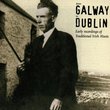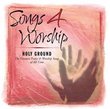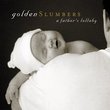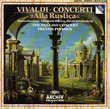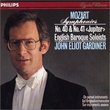| All Artists: Wolfgang Amadeus Mozart, Giuseppe Verdi, Sir John Barbirolli, Daniel Barenboim, New Philharmonia Orchestra and Chorus, English Chamber Orchestra, Montserrat Caballé, Janet Baker, Dietrich Fischer-Dieskau, Nicolai Gedda, Sheila Armstrong, Fiorenza Cossotto, John Vickers, Ruggero Raimondi Title: Mozart - Requiem / Armstrong · Baker · Gedda · Fischer-Dieskau · Barenboim & Verdi - Requiem /Caballé · Cossotto · Vickers · Raimondi · Barbirolli Members Wishing: 0 Total Copies: 0 Label: EMI Classics Release Date: 6/27/1990 Genre: Classical Styles: Opera & Classical Vocal, Historical Periods, Classical (c.1770-1830), Early Music, Modern, 20th, & 21st Century Number of Discs: 2 SwapaCD Credits: 2 UPCs: 077776289229, 077776289250 |
Search - Wolfgang Amadeus Mozart, Giuseppe Verdi, Sir John Barbirolli :: Mozart - Requiem / Armstrong · Baker · Gedda · Fischer-Dieskau · Barenboim & Verdi - Requiem /Caballé · Cossotto · Vickers · Raimondi · Barbirolli
 | Wolfgang Amadeus Mozart, Giuseppe Verdi, Sir John Barbirolli Mozart - Requiem / Armstrong · Baker · Gedda · Fischer-Dieskau · Barenboim & Verdi - Requiem /Caballé · Cossotto · Vickers · Raimondi · Barbirolli Genre: Classical
|
Larger Image |
CD DetailsSimilarly Requested CDs |
CD ReviewsMasterful performances of two wonderful works 04/23/2000 (5 out of 5 stars) "This is an extremely generous set. Not only does it have two spectacular works, but includes shining performances and comes at budget price as well. I am a Verdi fanatic, so I bought this mostly for the Verdi. His Requiem is one of his finest works, coming directly after "Aida," maybe his best opera. But the problem with the Verdi Requiem is that it is too long for one disc but only takes up about ten minutes on the second disc - so what do you fill it up with? Many recordings have Verdi's "Quattro Pezzi Sacri," which may be appropriate, but I don't like it very much. Other recordings simply have no filler. This recording, however, has a gorgeous performance of Mozart's excellent Requiem. Sheila Armstrong, the soprano, has a shimmering, pure, beautiful, above all a Mozartian voice - she shines in this recording. Baker has a rich voice that she uses with intelligence. Nicolai Gedda is radiant in the tenor role and Dietrich Fischer-Dieskau is at his considerable finest as the baritone. Daniel Barenboim conducts extremely well, and gets great singing and playing from his chorus and orchestra.The Verdi Requiem, though is even better, and receives even better performances. When this was made in 1969-70, all four principals were at the top of their form. Montserrat Caballé was at her best in the 60's through around 1972, and here she shows herself to be THE Verdi soprano of the last forty years. Her large, clear, glorious voice, seamless legato and magical pianissimi are heard to great advantage here. Her "Libera me" is a masterpiece of sound and vocal acting. Fiorenza Cossotto was similarly in her prime here, and she is stunning - powerful in the "Liber scriptus" yet capable of soft, tender singing and her "Lux aeterna" haunts the ear. Jon Vickers is an unusual tenor. Most operatic tenors have a dynamic range of loud, louder, loudest, but he has everything from fortissimo to pianissimo. His powerful voice is clearly not Italian, but he makes such a good impression in this role that you don't really care. Ruggero Raimondi's dark, rolling, majestic, magisterial bass is ideal for this role, and his low notes have a resonance that the ear drinks in greedily. Barbirolli takes slow tempi, but it never sounds sluggish, and the "Ingemisco," for example, sounds much better slower than taken at the speed of, say, Toscanini. The New Philharmonia Chorus and Orchestra are two of the finest ensembles in the world - particularly the rich, magisterial sound of the chorus is fantastic. These performances, packaged attractively, are the only ones you will ever need of the Mozart and Verdi Requiems." A most moving and interesting performance of Verdi's Requiem I. Martinez-Ybor | Miami, FL USA | 10/29/2006 (5 out of 5 stars) "I had this recording in LP and got it on CD immediately when issued. It has, without any doubt, the best singing of the female parts of any I can think of. Yes, I have heard most of them, many no longer in print. The timbre of Caballe and Cossotto voices provided a unique blend, here and in the opera house, in which the melisma of one was always anchored in the rock-solid brilliance of the other. The more one listens to these ladies in this performance, the more one realizes how, individually and together, they are unmatched elsewhere. We are lucky that this recording captured them at the peak of their powers. The "Recordare", almost a nostalgic lullaby, brings tears to one's eyes, Caballe's masterful portamento beautifully contrasted by Cossotto's Italian-onyx support. In another breathtaking moment, the "Agnus Dei", the voices are so synchronized that the unison octave singing by soprano and mezzo truly sound as one single miraculous voice praying for mercy and peace. No one has sung the "Libera Me" as beautifully or aptly as Caballe, both in the drama and the melisma, in her day, before, or so far since. Cossotto was the Italian dramatic mezzo of her generation; nobody came close. The ladies, splendid Verdians throughout their careers, are reason enough to purchase this performance of Verdi's greatest "opera." As for the balance: Barbirolli is slow, but so was Giulini, Reiner and others. For me it works: it is sombre but builds drama and power. One has to admit that there are different paths to this music, Fricsay's, Toscanini's, and de Sabata's being marked alternatives. I have learned to appreciate performances in their own terms, though one, of course, retains favourites. When it comes to interpretations, I particularly enjoy Fricsay's "live" RIAS performance (Stader, Dominguez and less luminary males), but would not part with the Barbirolli. It has provided me much joy, indeed solace, over many years. Vickers was unexpected casting for this part (though he was already the Otello of his day), but the inherent beauty of the voice, its heft, power, its unique "covered" quality (not found anywhere else since until one now hears echoes of it in Jose Cura's), the intensity he brings to the pleading text, these are treasurable indeed. Of course, Gigli, di Stefano, Bjoerling (earlier Toscanini and Reiner), bring different sounds and their splendid individual qualities to the part, quite different in appeal from Vickers, but this does not diminish the latter's contribution. Raimondi, for me, is the only weak link in the cast. He sings very well, but I prefer a darker bass in the part. As a group of soloists, I find this quartet stronger than that in Giulini's much more praised recording where neither Schwarzkopf nor Gedda are really appropriate. Chorus and orchestra perform superbly. This is a recording that warrants remastering. In LP as well as this CD incarnation, recorded sound favors base and has a boomy quality which makes one wish for greater clarity of sound. One hopes EMI is doing just that which is why it seems to be out the catalogue, one would hope temporarily. The Barenboim Mozart Requiem is quite fine, but there are (it seems) hundreds of others mit originalinstrumenten, full romantic orchestra, chamber orchestra, boy-choir, mixed-choir, this edition, that edition. I will let this one pass, except to say that it makes a very fine companion piece in a performance one can repeatedly enjoy (mercifully not another Quattro Pezzi Sacri which seem to have been composed with foreknowledge of their future as CD-filler for the Requiem and which I've never found terribly interesting)." Competent performances, some good soloists sphaerenklang | UK | 09/24/2001 (3 out of 5 stars) "The female soloists in this well-packed 2 disc set are as good as one could imagine, I don't need to go into details for those who have read the other long review. Gedda is also extremely good, but I have a reservation about Fischer-Dieskau, his theatrical overemphasis on certain words, which at one point sounds unintentionally comic next to the classically restrained diction of the other Mozart soloists. Vickers is not a particularly idiomatic tenor for Italian music, rather heavy and thick-voiced but with good projection of the text.The choirs and orchestras are both fine ensembles with no obvious shortcomings. My main complaint is that the conducting of both works is rather conventional and run-of-the-mill: lacking in the crucial element of tension, excitement and emotional involvement, in comparison with other recordings. First the Verdi, there are only one or two places where sparks threaten to fly, the rest of the time the internationally-famous cast just do a good, professional job... contrast the electric energy that jumps out from the Fricsay or Toscanini recordings, or the tragic, fatalistic pathos achieved by Serafin with an even more famous (if that is possible!) solo team. I would particularly recommend the Fricsay, it has one of the best-matched solo quartets, a tenor soloist the equal of any for musicality and beauty of tone, and the recording is clear and spacious despite dating from the mid-50s.In the Mozart similarly, Barenboim commits no major blunders, but again nothing out of the ordinary happens. This is a slightly old-fashioned approach with slowish, solemn tempos, and the conductor even uses some dubious changes of tempo within movements. This would not be a big drawback, except that solemnity is as good as it gets with as far as emotional range goes. This set will help you if you want to hear the notes of both pieces for the smallest possible price, but not if you want a truly exceptional musical experience..."
|

 Track Listings (16) - Disc #1
Track Listings (16) - Disc #1
